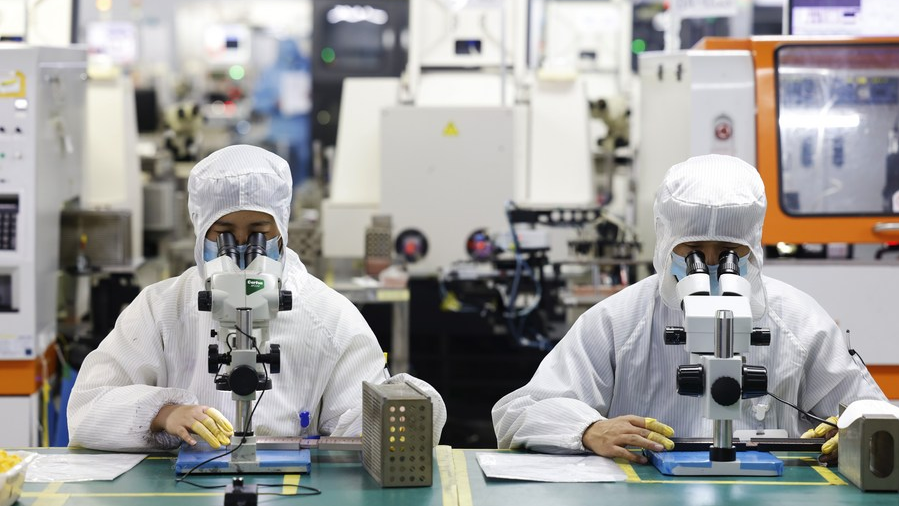
Editor's note: CGTN's First Voice provides instant commentary on breaking stories. The daily column clarifies emerging issues and better defines the news agenda, offering a Chinese perspective on the latest global events.
According to a Bloomberg's report on July 5, American officials are pushing the Netherlands to bar ASML Holding HV from selling mainstream technology essential in making large chunk of world's chips to China. ASML is already unable to ship the most advanced tools to China. The new ban, if agreed upon by the Dutch, would restrain the company from delivering the older deep ultraviolet lithography systems to China. These DUV lithography systems are the most commonly used machines in making less-advanced chips for cars, phones, computers and robots.
The reports says that American officials are also trying to get Japan to bar the same technology from reaching Chinese chipmakers.
When American politicians lecture other countries about "repression," they always like to say that "repression feeds innovation" and that you can't always keep a lid on things. Well, the same applies here. The United States' campaign to repress Chinese technological development can only feed Chinese innovation.
The U.S. objective is simple – keeping China from claiming more ground in the semiconductor industry and making sure China's "national champions" do not become global champions. It has been the strategy for successive administrations. Donald Trump launched a war on Huawei, SMIC and others. Joe Biden inherited and carried on the battle.
The United States should’ve known better just from the consequences of these confrontations. China has the world’s fastest growing chip industry. Despite or in spite of the headwinds from the West, 19 out of the 20 fastest-growing chipmakers over the last four quarters come from China, according to Bloomberg's report in late June. Only eight Chinese companies were on the list a year earlier. Semiconductor Industry Association’s data shows, in 2020, Chinese mainland's semiconductor device sales were close to $40 billion, accounted for 9 percent of global market, just behind Japan and EU's 10 percent market share each.

Workers make chips for export at an electronics company in Sihong, east China's Jiangsu Province, February 23, 2022. /Xinhua
Workers make chips for export at an electronics company in Sihong, east China's Jiangsu Province, February 23, 2022. /Xinhua
Of course, ASML's products are fundamental to chipmakers, especially with a near monopoly status on the manufacture of lithography system. But the lessons should have been clear: Repression feeds innovation. If America represses China's technology by blocking it from acquiring equipment from others, China will find a way to manufacture it at home.
The real damage, however, would be America and America's own "allies." The Chinese mainland is ASML's third largest market, accounting for about 16 percent of the company's sales in 2021, equivalent to 2.1 billion euros. Upon the Bloomberg's report, the value of ASML's shares in the U.S. dived 7.2 percent. U.S. News points out that U.S.'s own chipmaking companies Lam Research and Applied Materials lost 3.6 percent and 2.4 percent respectively after the story broke. With ASML's near monopoly status industry, international companies like Intel and Samsung that are dependent on ASML's machines to manufacture chips might also face adverse impacts. As Reuters described it, the ban could "worsen a global semiconductor shortage."
China is the Netherlands' third largest trading partner with a trade volume of more than $110 billion in 2021. It grew by nearly 27 percent from 2020. Among the EU members, the Netherlands was the biggest importer of goods from China in 2021. The Dutch prime minister openly said after this year's EU Summit that he opposes reconsidering trade relations with China over China's Hong Kong and Xinjiang policies. And while acknowledging U.S.' supremacy, he also advocated for more independent European policy towards China.
The United States pressuring the Netherlands to go along with its anti-China strategy is putting China-Netherlands relations at risk while forcefully dragging the Netherlands into its camp. Even as the U.S. considers lifting some of the trade sanctions on China to help its own economic problems, it's still sacrificing its allies' welfare and benefits to pursue its geopolitical goals.
The Netherlands needs to see clearly of the United States' schemes and put Dutch people's well-being above Washington's power plays. Following America's dictation could only hurt the Netherlands itself.
(If you want to contribute and have specific expertise, please contact us at opinions@cgtn.com. Follow @thouse_opinions on Twitter to discover the latest commentaries in the CGTN Opinion Section.)

